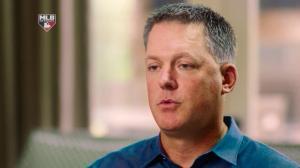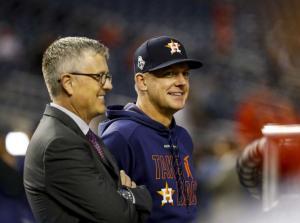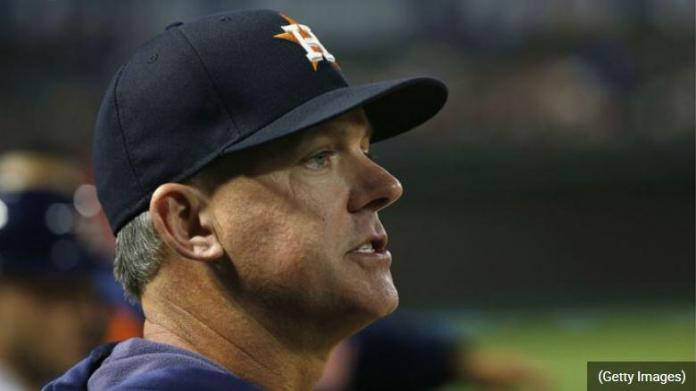Obviously, Major League Baseball, the Houston Astros and those who bore the brunt of the penalties for the sign-stealing scandal – former general manager Jeff Luhnow and manager A.J. Hinch – were hoping that the uproar would have died down by now. The passage of time has quieted the story to a degree. It’s still discussed, but the passion and intensity has reduced substantially. It’s not every minute of every day now.
However, it has not and will not go away completely until there is the perception of resolution. MLB saying it’s resolved and their investigation is concluded is secondary to how the rest of baseball, the media and fans react. Once the games start and it’s known how the Astros behave and play under new GM James Click and manager Dusty Baker; how other teams treat them and whether there is an overt attempt to extract a pound of flesh with vigilante on-field justice, it will bubble beneath the surface.
Since he was the manager, Hinch has been cast as being part of the problem. There is good reason for that. But for the most part, he seems to be categorized as having been caught in the crossfire with few good options to deal with the scheme as it was in progress. For Hinch, the first step at rehabilitating his image involved an interview with Tom Verducci on MLB Network. His response, tone, and general demeanor would be key factors for his future in baseball – if he even has one.

Hinch is taking the contrition route. He genuinely seems sorry and embarrassed, but it’s difficult to discern whether that is due more to his failure to act to put a stop to it or because of what the players did under his watch when he was in a position – in fact, it was his job – to regulate his players and set the rules. It’s a dual-edged sword to have a manager who is merely a conduit to the front office and not someone who has legitimate power. Hinch might have been well-regarded for his intelligence, but there’s no doubt that he was the former.
There was precious little he could realistically do to put a stop to the sign-stealing. Despite the Astros players’ assertion that had Hinch told them to stop, they would have, how could he have known that? He was in a situation where his role was clear to those who were supposedly under his charge; his bench coach, Alex Cora, was intimately involved in the plot; he was disposable to a front office that believes the manager is fundamentally replaceable; and the players might have simply ignored him had he told them to stop no matter what they said after the fact.
The lack of say-so granted to managers today has been discussed before, especially with the Astros. What is key here is how far Hinch’s interview will go toward laying the foundation for him to work in baseball again.
He is complicit, but he’s also an innocent bystander. To a degree, that does assuage his guilt for failing to act; it does not protect him from punishment; but it is an explanation.
Looking uncomfortable and meek in the interview, Hinch may have realized that leaving himself at the mercy of the viewers and MLB itself is the only way he can hope to get another chance for a job. Problematically, he gave lawyerly responses to Verducci’s questions as to whether the sign-stealing went beyond deciphering, relaying and garbage can banging. Regarding the allegations that the Astros players wore buzzers to get signals as to what pitch was coming, he did not say no. He said MLB did an investigation, that it was thorough, and he believes in it.
This behavior was prevalent throughout the interview. It could be argued that the contrition was as legitimate as his disapproval of the sign-stealing and his actions betray a similar impotence. He did not go far enough. This was not a tell-all interview; it was the beginning of an apology tour.
Will it work?
Baseball people have returned from suspensions, arrests and convictions. Hinch is well-liked. Although he’s got this black mark against him, that affinity will undoubtedly help him. As mentioned before, he didn’t stop the sign-stealing, but he didn’t start it either. That’s no excuse, but it is a defense to give him an opportunity to work again. Certainly, it would need to be gradual. A job in a front office could be followed by a stint as a bullpen coach. He could advance to a base coach and then bench coach before getting managerial interviews again. Teams would need to be prepared for the relentless attacks they would be subjected to, but if it’s a few years down the road and more information comes out to exonerate him or reduce his role in what is increasingly appearing to be Luhnow’s overall responsibility, perhaps Hinch can get a job as manager.

Still, there is always a chance that the toxicity of the Astros will stick to everyone involved. It’s next-to-impossible to envision Luhnow getting another job in baseball not just because of this, but because of the widespread animus he accumulated and enemies he made. Luhnow is not the type to apologize. His response will be calculated. If he does express remorse, his ability to come across as sympathetic is in question.
As for the others like Hinch, Cora and Carlos Beltran, the key is whether their post-scandal behaviors are sufficient to quell the anger and stop the story from continually being rehashed with the same level of anger there is now.
It should be noted that the wounds are still fresh and have not had the chance to scab. Judging by the initial reaction to the Hinch interview where he might have been thinking about how it would look as much as expressing his regret, he’s got a long way to go.


